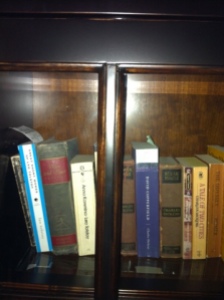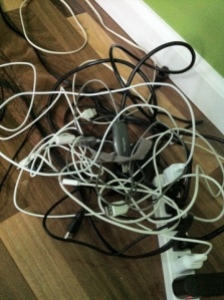 These are dark days for the physicality of books. Sales of physical books are falling further and further beneath the sales of the light and snappy e-books. Brick and mortar bookstores are closing across the nation. Wood and straw bookstores have been blown down by the Big Bad Wolf. Depressing news indeed.
These are dark days for the physicality of books. Sales of physical books are falling further and further beneath the sales of the light and snappy e-books. Brick and mortar bookstores are closing across the nation. Wood and straw bookstores have been blown down by the Big Bad Wolf. Depressing news indeed.
The first book I ever remember reading was Make Way for Ducklings. It was a big, dark green hardcover with a gold seal on the front. I used to take it to bed with me, and hold it under the covers. That was my habit with all my favorite books growing up, and it was not until I was sleeping with Introduction to Statistical Mechanics in 11th grade that my parents felt the need to intervene.
I was always very careful about my books. I had certain rules. A college classmate once wanted to borrow my copy of Utopia. I agreed to let her take temporary possession, but only upon her following my rules.
“Don’t open the book any wider than absolutely necessary, so that the spine does not crack.”
“Okay.”
“And try not to hold the book too much. Unless you are actually reading it, the book should lie flat on a hard surface, not too close to an open window, in case of rain, and not too close to a radiator. Heat can ruin the laminated cover.”
“Okay.”
“And if you absolutely must carry the book somewhere, hold it in your hand, but only if you can refrain from bending it. A lot of people have that tendency, I’ve noticed, during periods of stress or excitement. If you feel like you are entering one of those periods of stress or excitement, put the book inside of a backpack or satchel, but be very careful. Place it in the bag so that the spine is down and parallel with the ground, so that the corners do not get smushed by the sides of the bag.”
“Um, okay.”
“The best and safest place for a book,” I continued, “is a boofshelf. But bookshelves have their own pitfalls. For example, if there are too many books on one shelf, do not try to squeeze the book in between a small space. Otherwise the friction from the adjacent books as you try to squeeze it in will cause the book’s front and back covers to fold over, and once that happens…” I shuddered. “Just be careful, all right?”
She gave me the book back the next day. “I just couldn’t handle all the rules. I’m going to the bookstore now.” I caught her reading Utopia at the dining hall the next day, with the cover folded over. I shielded my eyes and ran out the door, appetite lost for the evening.
I was not a fan of the Kindle when it first came out. I remember telling my mother how stupid the device sounded.
“I mean, who wants to read a book on an electronic device? You don’t even get to turn the pages.”
“Oh, I think it sounds really cool. How much is it?”
“$349.”
“Well,” my mother said, “I’ll split it with you if you want one.”
And that how I ended up with a Kindle for $349. And I admit, it was pretty cool for a while. I downloaded hundreds of free books—Dickens, Tolstoy, Shakespeare—and marvelled at the library I held in my hand.
“Look, Dad,” I said to my father, “this Kindle holds hundreds and hundreds of books!”
“How many of them have you read?”
“That’s not the point.”
But in the end he was right. I found that reading from the Kindle did not yield the same satisfaction as reading from a physical book. Percentages and locations were sterile metrics compared to page numbers. And somehow I couldn’t shake the feeling that because the book really wasn’t there, but was just a temporary arrangement of electrons, that I was not really reading the book, and that when I shut the Kindle off for the night, and the words disappeared from the screen, the meaning would disappear from my brain as well.
So I’m back to reading physical books. Sure, they’re heavier, and more expensive, and take up space that certain household members believe would be better spent on vases and bowls of plastic fruit. But in this crazy and forgetful world, physical books assure that knowledge, meaning, and beauty are eternal. Just so long as the spine is uncracked.


